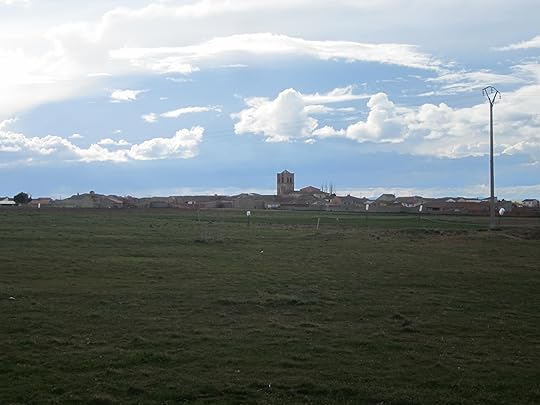U. Cronin's Blog, page 26
April 18, 2013
The Spanish Village
Almost everyone in Spain has a village — un pueblo. Whether they are currently living in the village or were born there and subsequently moved to the city or were born and bred in the city, they still have a village. Since the post-war economic boom, this having a village is a powerful, all-pervasive phenomenon of Spanish life. And it explains many things: it’s the reason why much of Spain (even the large cities) still has a down-home, rural, traditional feel to it, why there are so many unoccupied properties in the country (I’ve read figures of anything up to two million) and why, at key times of the year, the main roads become as clogged as a pie eating champion’s arteries.
OK. Some background. Post-Civil War Spain was a predominantly agricultural country. There were pockets of industry concentrated around the Basque Country, Catalonia and Madrid, but the majority of its population earned their living from farming. The country suffered from economic isolation during the Second World War and was later excluded from the Marshall Plan, but with the Hispano-US Pact of Madrid in 1953, the beginnings of a modernisation and industrialisation programme were seen. Around the late ’50s, early ’60s, Spain went through a remarkable boom and two factors were responsible for drawing young men and women away from their villages and into the larger centres of population. Firstly, there was the pull: new industries in the cities required workers, wages were good and city life was perceived to be less harsh and more “modern” than toiling on the land. Secondly, the push: with the modernisation and mechanisation of agriculture — including the replacement of horses and donkeys by the tractor and the introduction of combine harvesters and threshers — there was less work in the villages themselves. Many young people were surplus to requirements at home and were forced to find work in the cities.
This period saw huge waves of inward migration. Thousands left Extremadura in the south for Madrid. Similarly, huge numbers of gallegos left Galicia in the northwest for the capital. Andalusians tended to make for Catalonia, while Castilians and their neighbours from Leon headed north to the Basque Country (mainly to Bilbao and towns like Lasarte with its Michelin factory).
The thing is, the migrants continued to maintain strong links with their native villages, years and decades after bidding adiós, hasta la proxima to their families and friends. Summer and Easter holidays were spent back home. Very often, the kids were sent to granny and granddad to spend the long school holidays in the birthplace of their parents, with the result that many second-generation migrants consider themselves to have partly grown up in their parents’ village.
All this new mobility, of moving with relative ease between city and village, often separated by hundreds of kilometres, was as a result of two side shoots of the economic prosperity of the ’60s and ’70s: the development of Spain’s excellent system of motorways (autovías) and the availability of cheap, cheerful and (more-or-less) reliable cars, lead by Spain’s own mark, SEAT. Spanish people of a certain age fondly tell of epic journeys (and tailbacks) on crowded roads and in the boiling heat of August with no air-conditioning in their little SEAT 600‘s packed to the rafters with luggage and kids.
Many countries with similar stories of recent large-scale inward migration and equally strong family ties have seen the migrants’ relationship with the native village weaken when those left behind (especially parents) begin to die off. Why has this not happened in Spain? Why do the children, grandchildren and now great-grandchildren of those who left for the big city in the ’50s or ’60s return to their village year after year and continue to consider this place as much theirs as anyone who has spent their entire life there? The answer lies in Spanish inheritance laws.
In most parts of Spain (outside the Basque Country, Navarre and Catalonia) inheritance is partible, meaning that the worldly goods of the deceased are shared out among the children. So, for example, when Fulanito Rodriguez, who has 100 hectares of land, a large house with a corral (back yard) and five children, dies, the land, the house and corral are divided up among the five. This practice seems strange to us Irish, where, post-Famine, every effort was made to move away from a similar system (based on Brehon law) and keep the family farm intact, but is so widespread in Spain that a special initiative called the concentración parcelaria exists to maintain field sizes to efficient, workable levels.
Back to Fulanito! Two of his sons who stayed and made lives for themselves in the village (let’s call it Buenafuente de las Malvas) inherit most of the land, but the three who left thirty years ago (two daughters went to Madrid and the youngest son to Alicante) are not left wanting; they get the house, the corral, and an orchard of about one acre’s area. This means that the children (now adults with children of their own) have property in the village — a financial, as well as emotional tie to their birthplace. They also have what amounts to a summerhouse for themselves, their kids and grandkids. If the three siblings can come to some arrangement (divide the house into three or build a couple of new houses in the corral) their holiday retreat in the village of their birth can be heaven on earth. If, on the other hand, things get acrimonious between the siblings (and remember that partible inheritance and strangling Spanish title- and deed-transfer bureaucracy seem purpose-built to facilitate internecine warfare) the opposite can be true, but this is the exception rather than the rule.
In summary; the Spaniard’s ties to his (or his parents’ or grandparents’) village can be attributed to strong family bonds, the economic boom of the latter half of the twentieth century, and local inheritance laws. Remember then, the next bank holiday when you’re stuck in a two-hour traffic jam on the outskirts of Madrid think of el pueblo while your car bakes in the sun and you stew in your juices.

Castilian Landscape

Castilian Landscape


April 14, 2013
Moving Statue in Ennis
After the Ballinspittle story broke in the summer of 1985, the moving statue phenomenon spread like a contagion until it seemed like every town and village had its own miraculous Lourdes grotto. My home town, Ennis, was no exception. One morning in late Autumn, the town was ablaze with rumours that the statue of the Virgin Mary in the Pro Cathedral had been seen to move the previous evening. A group of children had been praying* at the grotto, which was installed within a small, cramped chapel at the back of the cathedral’s nave, when Our Lady smiled (or nodded or blinked or shuffled — I can’t recall exactly what She was supposed to have done).
I was in fifth class at the time — ten years old. The moving statue in the Cathedral was all we could talk about from when word spread around the school that a boy a couple of classes ahead of us was among the chosen few who had witnessed the wondrous event the evening before. I knew this lad well, but for all the wrong reasons. He lived on our road and was something of the district bully. I’d spent a recent summer studiously avoiding him on account of “payback” that was “coming to me” over some imagined infraction of mine. (In spite of his supposed toughness, this fella was highly sensitive to supposed slights!) Notwithstanding his reputation and the incongruity of the idea of this boy’s ever voluntarily setting foot in a church unless it was to drink the alter wine or rob candles, the notion that he may have seen a statue of the Virgin Mary move didn’t appear strange to us. Such were the times. And shur didn’t God love a sinner?
Those of us townies (more than half the kids in the school were bussed in from the country) in the class made a plan: as soon as the bell rang at a quarter past three we’d hare up town and get front row places at the vigil we assumed would be taking place at the grotto. When we got to the Cathedral, however, our hopes were dashed. The little chapel was crammed. A stream of closely-packed bodies was flowing out its door. No matter how much we wriggled and pressed, we couldn’t even get within a few yards of the entrance to the place. But we knew from the eerie silence that cloaked the chapel that something special was happening beyond our line of sight. There was none of the usual skitting or whispering that even the most solemn of masses hears. Besides a few oul’ wans rattling their Rosary beads, there was neither sound nor motion emanating from those keeping vigil.
My friends and I waited patiently and perhaps after half an hour sufficient people had left the chapel to allow us a chance to worm our way inside. We blessed ourselves and with our hands joined and maintaining in the cramped circumstances as reverent a comportment as possible, we stared with intent, studious reverence at the plain statue of the Virgin built into a stony nook a few feet above us. The only light in the chapel came from the dwindling daylight and a rack of candles in front of the grotto. Their flickering made it easy to imagine you saw the statue move. More than a few times, as I gazed unblinkingly at the alabaster I thought I had detected movement. Did Her head tilt? Did She raise Her shoulder slightly. Did She tilt back and forth?
But even my ten-year-old mind recognised the phenomenon of wishful thinking and had been schooled in scepticism by the plethora of Today Tonight and Radharc specials on Ballinspittle. The further into the vigil I got, the more disappointed I became. The statue wasn’t moving. Nobody around me was seeing it move. After perhaps half an hour of craning my neck and straining my eyes, my belly began to rumble and I felt the absence of the bickies and milk I usually had after coming straight home from school. A squadron of newly-arrived oul’ wans pushed their way to the front of the crowd and when this crack squad of latter day shawlies started belting out the Rosary, I knew it was time to leave.
The next day at school the story went around that, after we had left the grotto, an over-exuberant pupil from our cross-town rival — the Boys’ National School or “the Nash” — had, in his attempts to secure a better view of the Virgin, clambered onto St. Bernadette and somehow managed to break her hands off. We greeted this news with a mixture of glee and regret; we were delighted to see the name of the Nash being dragged through the mud but gutted at learning that church authorities had, in light of the incident, decided to close the grotto until further notice. And that, essentially, was the end of the moving statue craze in Ennis. Little more than a one-day wonder.
A few of us visited some of the other grottoes dotted around the town — the People’s Park, the Friary, Marian Avenue, St. Michael’s Villas, Hermitage — and had a good oul’ gawk, as they say. But nothing. Despite its population and density of grottoes, Ennis was to be out-rivalled by dozens of smaller, one-grotto towns and villages. I wonder though, if that boy from the Nash hadn’t broken off St. Bernadette’s hands, how long would the crowds have kept packing the little chapel at the back of the Cathedral and what would people have seen? Would Ennis have come to match Ballinspittle in its notoriety or would the novelty have worn off as quickly as in hundreds of places around the country at that time?
*In those days it was quite common for us children to stand vigil at grottoes “just in case” something happened. There were no PlayStations or Wiis and most of us had only two TV channels, so staring at lumps of alabaster was about all we had!


April 7, 2013
Griddle Cakes (Potato Cakes)
I’ve lifted this from Matthew Drennan’s Best of Ireland and thrown in a few variations of my own. Griddle cakes are great for heating up a body on a cold wintry day. Being almost pure carbohydrate beyond the bit of fat in the butter and milk, these are great energy-givers, although I wouldn’t be running the 800 metres after a feed of these, as they do tend to be very filling. Just as with pancakes, you can be very creative with what you spread on griddle cakes (or dip them into): whipped cream, jam, butter, sour cream, cheese, savour sauces.
Makes 6
Ingredients
225 g/8 oz potatoes
115 g/4 oz/1 cup plain flour
1.5 ml/¼ tsp salt
1.5 ml/¼ tsp baking powder
15 g/½ oz/1 tbsp butter, plus extra for frying if you chose not to use olive oil
25 ml/1½ tbsp milk
Olive oil for frying
1. Cut the potatoes into small cubes. Place in saucepan and cover with cold water. Bring to the boil, reduce the heat, cover and simmer for 20 min, until tender (until a butter knife will pass through with ease).
2. Drain the potatoes and dry out over a high heat for 1 min, until all traces of moisture have evaporated. Mash well, leaving no lumps.
3. Sift the flour, salt and baking powder into a bowl. Rub in the butter with your fingertips until combined. (My favourite part. I love the buttery smell of my hands afterwards!)
4. Add the mashed potato and mix thoroughly with a fork. Make a well in the centre and pour in the milk. Bring the mixture together to form a smooth dough.
5. Turn out on to a floured board and knead. Roll out to a round 5 mm/¼ in thick. Either use cookie cutters to shape the dough (see accompanying pix) or, more traditionally, cut in half, then cut each half into three triangles.
6. Grease a griddle or large frying pan with some butter and heat until very hot. Fry the cakes for about 3-4 min, until golden brown, turning once during cooking, then serve hot.


April 2, 2013
Short Story: The Strike (Part II)
The Strike (Part II)
She felt like snapping the laptop shut. He always took to insults when he couldn’t reason his way out of an argument. When she didn’t answer he looked apologetic and spoke more softly: “So this strike tomorrow — today — in the morning, for you, whenever, are there gonna be protests and stuff? Marches, barricades, sit-ins? All that stuff we hear about Greece ‘n’ France ‘n’ places?”
“Sure are! We’re all having a sit-in in the university here first thing in the morning. Which reminds me I must get some sleep soon! And then we’re going on the big march — la gran manifestación — later on.
“No way! You godda be kidding!”
“Yes way! It’s gonna be awesome! I’ve never done anything like this before. When we were doing up banners yesterday, I really felt like I was part of something. A lot of the gang are involved in the 15M movement. Today, is gonna be a totally new experience for me. And like the gang say, every single person out protesting tomorrow is a voice the government can’t afford to ignore.”
“I just cannot believe this!” He shook his head wildly. Ruth noticed that his hair stayed perfectly in place. “You’re not going on any march tomorrow or any of that crap! No way, hon. Are you crazy? You’re on a visa over there. If you’re arrested, you can be deported. Or imagine if you come back home with a criminal record. You’re marked for life!”
“Fuck James. You so much have turned into the real little Republican in the last few months. What’s happened?”
“The only thing’s happened is you deciding to go native over in Europe. I know about Spain. I’ve been reading up on it. They changed the right to free assembly lately. It’s close to being a police state, which is understandable; it’s only been a democracy for, like, twenty years.”
“More like thirty-something years.” This was an area on which she was definitely the greater authority. She eagerly anticipated his repost.
“Whatever. But those cops we see on TV in Athens ‘n’ places. They don’t take any crap. I saw ‘em beating the crap out of people with their batons. Old people included.”
“So whatcha want me to do, James? Stay off the streets today? Lock myself in my room ‘n’ watch daytime TV?” She threw an angry look of challenge into her laptop’s tiny, built-in camera.
“Well, you could do something more productive than watching TV, but, yeah, I’d stay away from the barricades if I were you.”
“Stay away from the barricades, huh? That’s real manly advice, James. Thanks a heap!”
“Speaking of manly. Who’s that guy beside you at the gig, in the photo you tweeted today? Coz he looks like a real man — he’s like a Yeti, he’s got so much hair going on!”
“Oh, that’s Roberto! He’s a sweetie. And he’s so cool. He was camping out in Sol last year for, like, weeks. He’s the real deal. A real smash-the-system advocate.”
“And he’s “one of the gang”? This Roberto guy is holding down a place at school?”
“Actually, Roberto is doing a Ph.D. He tutors us on a module called “The Language of Political Discourse during the Second Spanish Republic.” It’s fascinating stuff―”
“Sounds like BS to me.”
“—and he’s a real interesting guy to be around. He’s turned me on to a lot of things I’d never even thought about before. He’s so clued-in on politics and spin and the language used by the political elites to pull the wool over the people’s eyes. He’s taught us how to analyse official government press releases; to identify the tricks they use to camouflage their lies. It’s amazing! Most of what the government here tells the people is nothing short of propaganda, basically. And I guess back home too.”
Ruth could see that James was barely listening to her, was looking impatiently beyond his laptop, perhaps looking out the window or at a muted TV at the other end of the room. She arched her eyebrows and smiled wryly into her camera waiting for the silence to snap him out of his reverie. After a few seconds he looked down again and said: “That’s not the first photo I’ve seen of both of you like that — hugging and laughing. You mightn’t have noticed it, but you seem to be posting a lot of pictures of the two of you together.”
“Oh my God. You are totally being a jerk tonight. If you could hear yourself! Whatcha think I’m doing over here? Sneaking round seeing people behind your back?”
Ruth saw James stiffen. “I never said that. I just commented that you seem to be spending a lot of time with this Roberto.”
She, in turn adjusted her own posture, making the laptop bounce on the bed. “What then? What are you saying? That you want me to stay in here all day waiting for you to Skype? That I’m not allowed to talk to other boys? Don’t start trying to control me from the other side of the world, coz it’s not happening, James.”
“No one said anything about trying to control anyone. It’s just . . . I dunno. Since you’ve been over there I feel like you’re becoming a different person. All this new stuff you’re doing. Your blog. Your Twitter. Those photos with all your new friends. Your hair, your clothes. Everything about you is different. It’s like they swapped my Ruthie for a stranger somewhere over the Atlantic two months ago.”
She was about to ask him how he dared, to give him a piece of her mind, unleash two months of stored-up grievances, click the ‘end call’ button and go to bed, when she was pulled up by a torrent of thoughts, as if James’ half-accusatory, half-baffled statement had broken a dam in her mind. The realisation hit her was that he wasn’t wrong; she was a different person to the girl who had boarded the plane in JFK Airport at the start of September. From the superficial (haircut, clothes, diet) to the profound (language, politics, circle of friends) she was changed. The act of transplanting herself to a foreign country and throwing herself into the language, the culture, the noise and the dynamism of that place had altered her. On the contrary, James had remained unchanged and in a sense, without her day-to-day moderating influence he had become more himself than ever ― almost a cartoon version of himself ― hence tonight’s regression to the free voicing of opinions he must have known would rile her. She studied his features on the bright screen. He was scowling slightly, biting his lip, waiting for her to speak. There was something impossibly all-American to the way he looked, with his orange-brown shiny skin, finely-drawn eyebrows, sharp cheekbones and regulation strong chin. The scowl, however, lent him an air of frustrated, teenage petulance. She’d had thought about it before, but now she knew for sure that he must be feeling left behind, that they were acting out that great cliché of the couple on the rocks because of one party leaving for a new school, city or, in this case, country.
“Listen, James, I better go to sleep. I’m pooped. But we need to talk seriously, real soon. We can’t go on bickering like this. How ’bout tomorrow? The usual time.”
She knew now where all his anger was coming from, the snide remarks, the requests for cyber sex: he was afraid of losing her.
“OK, hon,” was all he said, his voice dry with disappointment. She watched his head grow larger as he leaned forward to cut the connection and then, for a few moments, she stared almost mesmerised at the blackness that followed. She closed Skype, turned off the laptop and walked across the room to leave it on her study desk. On her way back to bed she looked out the window and was taken by surprise by the lack of traffic on the normally busy street below. While there were plenty of bunches of high-spirited students returning from the many bars in the area, not a taxi, nor a bus, nor a car passed by. She stopped thinking about James and what she’d say to him tomorrow and remembered the general strike. Going for her smartphone, she took a picture of the traffic-free street and was about to tweet it when she instinctively thought: “James won’t like this” and hesitated. Her fingers hovered over the phone’s screen for a moment, on the brink of closing down the camera menu and putting it to sleep for the night.
“But you’re breaking up with him tomorrow night,” she told herself. “After you come home from the march.”
The beginnings of a smile on her face, she jabbed the screen and with a few deft touches shared the photo of the empty street with all her friends.
###
Copyright U. Cronin


Short Story: The Strike
The Strike (Part II)
She felt like snapping the laptop shut. He always took to insults when he couldn’t reason his way out of an argument. When she didn’t answer he looked apologetic and spoke more softly: “So this strike tomorrow — today — in the morning, for you, whenever, are there gonna be protests and stuff? Marches, barricades, sit-ins? All that stuff we hear about Greece ‘n’ France ‘n’ places?”
“Sure are! We’re all having a sit-in in the university here first thing in the morning. Which reminds me I must get some sleep soon! And then we’re going on the big march — la gran manifestación — later on.
“No way! You godda be kidding!”
“Yes way! It’s gonna be awesome! I’ve never done anything like this before. When we were doing up banners yesterday, I really felt like I was part of something. A lot of the gang are involved in the 15M movement. Today, is gonna be a totally new experience for me. And like the gang say, every single person out protesting tomorrow is a voice the government can’t afford to ignore.”
“I just cannot believe this!” He shook his head wildly. Ruth noticed that his hair stayed perfectly in place. “You’re not going on any march tomorrow or any of that crap! No way, hon. Are you crazy? You’re on a visa over there. If you’re arrested, you can be deported. Or imagine if you come back home with a criminal record. You’re marked for life!”
“Fuck James. You so much have turned into the real little Republican in the last few months. What’s happened?”
“The only thing’s happened is you deciding to go native over in Europe. I know about Spain. I’ve been reading up on it. They changed the right to free assembly lately. It’s close to being a police state, which is understandable; it’s only been a democracy for, like, twenty years.”
“More like thirty-something years.” This was an area on which she was definitely the greater authority. She eagerly anticipated his repost.
“Whatever. But those cops we see on TV in Athens ‘n’ places. They don’t take any crap. I saw ‘em beating the crap out of people with their batons. Old people included.”
“So whatcha want me to do, James? Stay off the streets today? Lock myself in my room ‘n’ watch daytime TV?” She threw an angry look of challenge into her laptop’s tiny, built-in camera.
“Well, you could do something more productive than watching TV, but, yeah, I’d stay away from the barricades if I were you.”
“Stay away from the barricades, huh? That’s real manly advice, James. Thanks a heap!”
“Speaking of manly. Who’s that guy beside you at the gig, in the photo you tweeted today? Coz he looks like a real man — he’s like a Yeti, he’s got so much hair going on!”
“Oh, that’s Roberto! He’s a sweetie. And he’s so cool. He was camping out in Sol last year for, like, weeks. He’s the real deal. A real smash-the-system advocate.”
“And he’s “one of the gang”? This Roberto guy is holding down a place at school?”
“Actually, Roberto is doing a Ph.D. He tutors us on a module called “The Language of Political Discourse during the Second Spanish Republic.” It’s fascinating stuff―”
“Sounds like BS to me.”
“—and he’s a real interesting guy to be around. He’s turned me on to a lot of things I’d never even thought about before. He’s so clued-in on politics and spin and the language used by the political elites to pull the wool over the people’s eyes. He’s taught us how to analyse official government press releases; to identify the tricks they use to camouflage their lies. It’s amazing! Most of what the government here tells the people is nothing short of propaganda, basically. And I guess back home too.”
Ruth could see that James was barely listening to her, was looking impatiently beyond his laptop, perhaps looking out the window or at a muted TV at the other end of the room. She arched her eyebrows and smiled wryly into her camera waiting for the silence to snap him out of his reverie. After a few seconds he looked down again and said: “That’s not the first photo I’ve seen of both of you like that — hugging and laughing. You mightn’t have noticed it, but you seem to be posting a lot of pictures of the two of you together.”
“Oh my God. You are totally being a jerk tonight. If you could hear yourself! Whatcha think I’m doing over here? Sneaking round seeing people behind your back?”
Ruth saw James stiffen. “I never said that. I just commented that you seem to be spending a lot of time with this Roberto.”
She, in turn adjusted her own posture, making the laptop bounce on the bed. “What then? What are you saying? That you want me to stay in here all day waiting for you to Skype? That I’m not allowed to talk to other boys? Don’t start trying to control me from the other side of the world, coz it’s not happening, James.”
“No one said anything about trying to control anyone. It’s just . . . I dunno. Since you’ve been over there I feel like you’re becoming a different person. All this new stuff you’re doing. Your blog. Your Twitter. Those photos with all your new friends. Your hair, your clothes. Everything about you is different. It’s like they swapped my Ruthie for a stranger somewhere over the Atlantic two months ago.”
She was about to ask him how he dared, to give him a piece of her mind, unleash two months of stored-up grievances, click the ‘end call’ button and go to bed, when she was pulled up by a torrent of thoughts, as if James’ half-accusatory, half-baffled statement had broken a dam in her mind. The realisation hit her was that he wasn’t wrong; she was a different person to the girl who had boarded the plane in JFK Airport at the start of September. From the superficial (haircut, clothes, diet) to the profound (language, politics, circle of friends) she was changed. The act of transplanting herself to a foreign country and throwing herself into the language, the culture, the noise and the dynamism of that place had altered her. On the contrary, James had remained unchanged and in a sense, without her day-to-day moderating influence he had become more himself than ever ― almost a cartoon version of himself ― hence tonight’s regression to the free voicing of opinions he must have known would rile her. She studied his features on the bright screen. He was scowling slightly, biting his lip, waiting for her to speak. There was something impossibly all-American to the way he looked, with his orange-brown shiny skin, finely-drawn eyebrows, sharp cheekbones and regulation strong chin. The scowl, however, lent him an air of frustrated, teenage petulance. She’d had thought about it before, but now she knew for sure that he must be feeling left behind, that they were acting out that great cliché of the couple on the rocks because of one party leaving for a new school, city or, in this case, country.
“Listen, James, I better go to sleep. I’m pooped. But we need to talk seriously, real soon. We can’t go on bickering like this. How ’bout tomorrow? The usual time.”
She knew now where all his anger was coming from, the snide remarks, the requests for cyber sex: he was afraid of losing her.
“OK, hon,” was all he said, his voice dry with disappointment. She watched his head grow larger as he leaned forward to cut the connection and then, for a few moments, she stared almost mesmerised at the blackness that followed. She closed Skype, turned off the laptop and walked across the room to leave it on her study desk. On her way back to bed she looked out the window and was taken by surprise by the lack of traffic on the normally busy street below. While there were plenty of bunches of high-spirited students returning from the many bars in the area, not a taxi, nor a bus, nor a car passed by. She stopped thinking about James and what she’d say to him tomorrow and remembered the general strike. Going for her smartphone, she took a picture of the traffic-free street and was about to tweet it when she instinctively thought: “James won’t like this” and hesitated. Her fingers hovered over the phone’s screen for a moment, on the brink of closing down the camera menu and putting it to sleep for the night.
“But you’re breaking up with him tomorrow night,” she told herself. “After you come home from the march.”
The beginnings of a smile on her face, she jabbed the screen and with a few deft touches shared the photo of the empty street with all her friends.
###
Copyright U. Cronin


March 22, 2013
Short Story: The Strike
Author’s Note: On November 14, 2012, Spain experienced the latest in a series of general strikes (huelgas generales). My partner and I went to an XX gig on the night of the 13th. With metros and buses not really running after midnight, we had an interesting time getting home. It was a young crowd at the concert — a lot of expats, especially Americans. This story is inspired by that night.
By the way, I’ve posted only 50% of The Strike; the rest will come next week! I’ve to keep you guessing!
The Strike (Part I)
“One of the worst gigs I’ve ever been to,” she says.
“Wow — one of the worst. How crummy is that?”
“Yeah. The most . . . let downiest. For sure.”
“The biggest let-down, you mean.”
“Thanks, Shakespeare.”
“Thou art more than welcome, milady!”
Two laptops, one in the barrio of Moncloa, Madrid, the other in Cornell, New York State, are joined over the world wide web. A girl in a small, narrow bedroom talks quietly so as not to wake her flatmates, the sound of nocturnal Spanish street life accompanying her whispers. The boy, at a desk in his dorm room on campus, has been granted a half-hour by his room-mate and has locked the door just in case. Each is disappointed with how the other looks; unforgivingly displayed as glowing pixels on each other’s screens. She is dowdy today, he thinks; unsexy in her pyjamas. He doesn’t like the way their baggy flannel conceals her figure. He was secretly hoping she’d appear wearing lingerie (as she had on a couple of occasions) as the connection blinked open. To her eyes, squinting in the dim lamplight, he’s as preppy as always; cream slacks, blue shirt, hair slicked back. Since she moved abroad, he looks more and more to her like one of those smug, genetically-engineered models from a Tommy Hilfiger ad.
“I mean, I’d been looking forward so much to seeing them live. The new album is great. But I couldn’t fucking hear them! Everybody was talking so much. And some of their songs are so, like, sparse. You know, like everyone, c’mon, shut the fuck up!”
“That’s the Spanish for you; yapping all the time. Just like the Puerto Ricans you see on the subway. They just can’t shut up. Or talk at a reasonable volume.”
“Aw, come on, James. You can’t say that.”
“Why not? It’s true. Anyway. D’ya wanna do what we did the other night?”
She shuffled on the bed, where she was sitting Indian-style. “I dunno, James. I felt all icky doing it the last time. It felt like porn. Like you weren’t really with me. Like it wasn’t you. I dunno.”
“Well ― daw. I wasn’t really with you. It’s Skype. You’re in Spain and I’m in the good ol’ US of A.”
“C’mon; Don’t be a jerk, James. I—”
“Great word choice. Ha, ha!”
“―I felt cheap or something. And you never know who’s watching. You know — hackers or whoever. And are you sure you didn’t record it? I’d feel like a whore if that got out.”
“I promise. And anyway, you’ve done worse in my actual presence.”
“Yeah, but doing those things into a webcam is different. I didn’t really enjoy it. Can we give it a skip?”
“Sure, hon.” This didn’t come across as too convincing. He sounded let down “Who were you with today — tonight? I’ll never get the hang of this.”
“Oh, the gang. The guys from the Siglo de Oro module.”
“Guys? Are you going around like Snow White and the Seven Dwarves? One woman among many men.”
“Har, har, James. There was a mix. Guys ‘n’ gals. It’s great; they’ve kinda adapted me—”
“Adopted.”
“I beg your pardon?” James tended to correct her grammar quite a lot, which was ironic, because she was the language major. He was studying molecular biology.
“Adopted; you said ‘adapted’. It’s adopted.”
“Did I? Did I really. That’s awesome! D’you know what that means? I’m losing my English! That’s seriously awesome! You know, I’m only speaking Spanish these days. It’s just on Skype that I’m hablando en inglés.”
“Well, when you get back home all the cleaning ladies and janitors around here will be so happy with you. You’ll be able to hablar the ol’ español perfectly with them!”
“Aw, come on, James. Not that old line again. That’s so bigoted and nasty and you know it.”
“Jeez! Sorry for having a sense of humour. Lines like that are low-hanging fruit, hon. I can’t pass up on them!”
“Anyway, it took us forever to get home from the venue, this amazing place near the Puente de Segovia and right across from the royal palace called the Riviera. There’s a general strike today, as of midnight. We got out of the place at eleven fifty and ran to the nearest metro, but got there just after midnight. No trains running, so we walked home. Nearly an hour. But here I am, safe and sound. But tired, ha! All that grooving, and then an hour’s walk.”
“A general strike? Jeeze Louise. What sort of tin-pot country has a general strike? Sounds like something from a documentary on the 1930s or some crappy Latin American socialist workers’ republic.” He made an imaginary bullhorn with his hands. “What do the workers demand? Extra rations! More bullfights! The new iPhone 5! When do we want it? Now!”
“God, James. It’s serious. The crisis. People are really suffering here. Unemployment is crazy high — 25 percent. Those lucky enough to have jobs have had their wages cut. The government has made it super easy to fire people. There’s even talk of introducing a charge for health care.”
“Oh, my goodness. People might actually have to pay for their health care! I love Europe. It’s dying on its knees, but everyone still has free health care. Cradle-to-grave welfare state. No wonder it’s screwed. If people actually got up off their asses and worked . . .”
“Fuck, James, you sound like a real reactionary. What’s wrong with you?”
“There’s nothing wrong with me,” he huffed. “I just believe in the American way of doing things.”
“Well, think about how much money it’s costing to put your ass through Cornell and then consider that, over here, the fee for university is less than five thousand dollars a year. Whatcha think of that?”
“Crap, Ruthie; that’s what I think of that. Are they turning you into some sort of pinkie over there?”
###
Copyright U. Cronin


March 17, 2013
St. Patrick’s Day
I’ve never really been a St. Patrick’s day person. Never being much into crowded pubs, parties or parades, the day has always passed me by. When I lived in Ireland, I often took advantage of the day to catch up on work. Paddy’s Day 1998 was spent not at Galway’s Macnus-led parade nor in any of her thousand or so pubs but giving my final-year project a push over the line before the end-of-term deadline. The following two years, I enjoyed peaceful days alone in the plant tissue culture lab I was doing my M.Sc. in, taking long, solitary cigarette breaks and savouring the unusual mid-week stillness of UCC’s spring campus. It was during my first stint in Spain that (like many Paddies that find themselves abroad) I thought of drowning the shamrock for my very first time. The day turned out to be a disaster; me, my girlfriend and some friends started drinking in one of Madrid‘s half dozen or so genuine Irish bars shortly after midday, with the expectation of a long, joyful session stretching out before us, only for revelries to be cut short an hour later when my girlfriend’s handbag was stolen. That was to be both my first and last attempt to have a text-book all-day-in-the-pub St. Patrick’s Day.
When I moved back to Ireland, Paddy’s Day again became an opportunity to get some tranquil bench work done. The 17th of March 2005 was dedicated to tending my bacterial cultures and fumigating a laminar flow hood — all in the midst of great peace and quiet. The following year, my father caught pneumonia watching the parade from Ennis’ wintery footpaths and entered a spiral of ill-health that eventually saw him off by October of that year. I don’t think I’ll ever be able to hear the words “St. Patrick’s Day parade” without thinking of him shivering and hopping from foot to foot as he watched pipe bands and boy scouts pass before him.
Now that I live abroad again and have kids there’s no chance of either going on an all-day pub crawl or bringing them to see the parades, hurling matches or dog shows that formed part of my boyhood St. Patrick’s Days. I don’t get a day off work and neither do the kids get a holiday from school. There’s no in-your-face St. Patrick’s Day celebrations here in Madrid. We’re not part of any expat Irish community (we’re not great joiner-inners!). It would be easy to let the whole shebang wash over us, just pretend today is like any normal Sunday. But no: there’s something about St. Patrick’s Day and wanting your kids, at least for one day, to celebrate their Irishness. We’ll do our best to mark the day in our own nuclear-Irish-family-living-abroad way. We’ll don the green, every man woman and child of us. The house will be decked out in shamrock and tricolours. Griddle bread will be made — and shaped with rainbow, shamrock and pot-of-gold cookie cutters. Irish stew will be consumed. Diddle-dee-eye music — and diddle-dee-eye music only — will be played. We’ll toast St. Patrick and Ireland and St. Brigid and Emma and Ogie and Ray D’Arcy and Jedward and our family and friends back home and have our own special Hispano-Hibernian Paddy’s Day. And some year the penny will drop with my little girls about why they speak funny, have strange skin and hair, no respect for authority, wicked senses of humour and a stone-mad streak running through them that those around them seem to lack; they’re Irish!
Beannacht Lá Fhéile Pádraig Libh!


March 10, 2013
Moving Statues Part I
Two years ago, I would have looked at you askance if you’d told me that I’d finish up writing a book about moving statues (or more correctly, a book whose plot turns on a moving statue incident [phenomenon?] in a small village in Co. Cork). It was an excellent – and from my point of view, life-changing – RTÉ Radio documentary that sparked something in me. In the documentary, ‘The Summer of Moving Statues‘, a garda who has become over the years one of Ballinspittle’s most vocal ‘witnesses’ and defenders, described a number of chilling incidents that took place at the height of Bellinspittle’s fame during the summer of ’85. Apparently, not everyone who went to see the statue of the Virgin move got what they bargained for. Some people were seen to practically flee the grotto in tears or looking very shaken. The garda described groups of people who saw the statue change into “a male figure . . . so distinct and frightening . . . a male figure with its hands over its face . . . the fingernails on this figure . . .” He also spoke of a woman in the middle of the throng of people “crying hysterically . . . and she said: ‘He’s all blood’.”
These reports stopped me in my tracks, made the hairs stand up at the back of neck, and also got me thinking.
“Wouldn’t that make a great book? You go to see a moving statue and instead of seeing something good, something holy, you get the living daylights scared out of you.”
From then on, my imagination ran riot and The Grotto was born.










